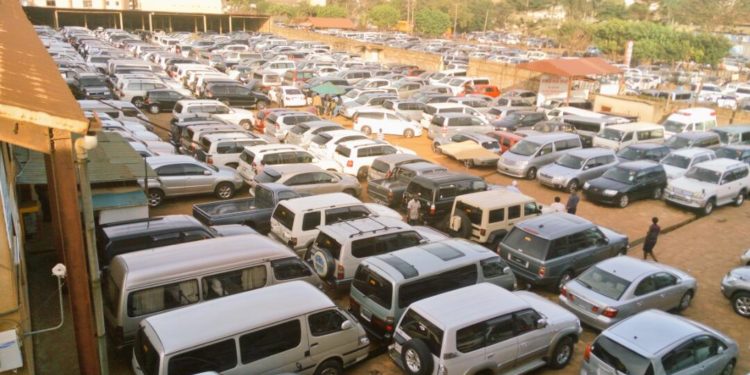Uganda Revenue Authority-URA is finding it difficult to collect up to Shillings 172 billion from used vehicles in bonded warehouses using the current tax administration system. According to the current system, all imported vehicles are required to pay taxes in a period not exceeding 9 months from the time of importation.
The tax body is mandated to auction such vehicles and recover the taxes upon the expiry of the nine months period. Abel Kagumire, the Commissioner of Customs reveals that at least 40,407 motor vehicles were in 83 licensed car bonds between January and December 2021 accounting for Shillings 735 billion.
He, however, says that out of this, Shillings 172 billion is still outstanding in taxes. In an effort to address this challenge, URA has introduced a new tax administration measure that is expected to start on July 1st, 2022. This bars warehousing vehicles older than nine years.
Those importing such vehicles will be required to clear all the taxes at the port of entry before they are allowed into the country. According to Kagumire, the new measure will reduce the risk of such vehicles expiring in the bonds before clearing taxes.
The Traffic and Road Safety Act bars the importation of vehicles older than 15 years because of their threat to the environment. In case a motor vehicle hits 15 years, it cannot be allowed in Uganda. “In March and December 2021, 365 vehicles with a value of UGX. 4,529,183,401 in taxes expired during the warehousing period,” Kagumire explained.
He also reveals that several car importers have a tendency of smuggling the cars meant for warehousing into neighbouring countries where they obtain foreign number plates and return them to the country.
According to Kagumire, the new measure will solve this problem as well. “Warehoused motor vehicles have reduced by 19.33% while those that paid taxes directly at the ports of entry increased by 45.8% between 2017 and 2021,” Kagumire explained.
Ibrahim Bbosa, the head of corporate and public affairs at URA, says although the tax body is mandated to auction vehicles that exceed nine months in the warehouse, he says that the process involves costs, which sometimes are not even recovered.
Data from URA indicates that in the last five years, the number of vehicles cleared at the port of entry has increased. Statistics show that warehoused motor vehicles have reduced by 19.33% while those that paid taxes directly at the ports of entry increased by 45.8% between 2017 and 2021.
In the last four years, revenue collected from warehoused vehicles reduces from Shillings 530 billion in 2018 to Shillings 456 billion in 2021 whereas taxes collected directly from the ports of entry increased from Shillings 47.8 billion to Shillings 76.4 billion.
Some importers ,say that whichever way URA administers the tax, it will come back to the same answers. They also wonder why URA doesn’t use its auctioning powers effectively to avoid such losses.
Fred Kaggwa Mayanja, a used car importer explains that in every second-hand car bonded warehouse, there is a stationed URA officer responsible for collecting this tax and wonders how such losses arise.
Muhamad Mubiru, an importer who also operates a car warehouse, says that when a car is in the bond, URA is assured of its taxes no matter the situation.
Do you have a story in your community or an opinion to share with us: Email us at editorial@watchdoguganda.com













